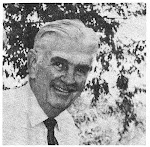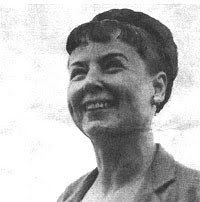Part of the book’s success lies in it being a classic
“journey” or “road trip” genre of story as well as being a fountain of
information on geography, culture, and humanity along the waters of the Great
Lakes and the St. Lawrence Seaway. It
was also an uplifting story, published during bleak days as the world went to
war. Equally interesting is the back
story of how Paddle came to be created.
In the late 1930s, Holling and his wife Lucille
were road tripping the country. While in
Galveston, they received a letter from Lovell Thompson, editor of children’s
books at Houghton Mifflin, a publisher founded in Boston in 1832. Having seen Holling’s Quaker Oats pioneer
series, Thompson asked what kind of books Holling might do for Houghton. The couple eventually had a quick luncheon
meeting with Thompson in Boston, and Holling suggested a story about the
Missouri River. Then, the Hollings returned
to the road. Some weeks later, they were
in Ontario and met a Chippewa woman selling birch bark baskets. Seeing a carving of an Indian figure kneeling
in a canoe, he learned it had been made by an 11-year-old boy. Holling and Lucille were given the carving,
or makak, for having taught the woman original designs of her people, those she
had forgotten.
The story of a carved Indian boy in a canoe began
to come together while the couple ambled back to California. Months were spent researching the route through the lakes (some of which
Holling knew from working on the water), drawing with watercolor and pen,
laying out the pages. The work then was
sent to Boston, Paddle-to-the-Sea was published in 1941, and Holling’s name was established.
The following year, Holling Clancy Holling was honored for his Paddle-to-the-Sea. The Caldecott is awarded by the Association of Library Service to Children to a winner and with honorable mentions for the most distinguished contribution by artists who are American citizens or residents. The ALSC is a division of the American Library Association and a true assurance of excellence in illustration.
And the rest, as they say, is history. Except that this remarkable book continues to be celebrated 75 years later.
I’m indebted to Hazel Gibb Hinman’s [1910-2004] thesis
dissertation that was published by the University of Redlands in 1958, titled The Lives and Works of Holling Clancy
Holling. The Houghton Mifflin
illustration is reproduced from Harmen Hielkema’s blog site at http://harmenhielkema.blogspot.com/2013/09/paddle-to-sea_29.html.










Lucille had family my grandmother Barbara Andresen and her brother Paul.
ReplyDelete